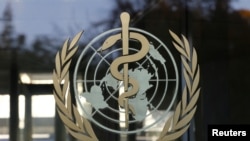A highly touted Chinese drive to raise funds for the World Health Organization, launched after President Donald Trump announced he was ending financial support for the WHO, has raised less than $10,000 in its first month, according to data posted on the fund's website.
The numbers reveal what critics say is a routine gap between Beijing's high-profile public statements of support for international institutions and its actual follow-through.
Beijing's announcement May 20 for the charity drive included international media coverage and an appearance via videoconference by Tedros Adhanom Ghebreyesus, WHO's director-general, who thanked officials for the plan "to facilitate donations from people and companies across China to support these life-saving efforts."
A month later, the effort named "COVID-19 Solidarity Response Fund for WHO · Action of China," shows on its website that it has raised about $9,500, despite a push by 20 internet-based Chinese fundraising platforms to solicit donations.
Beijing's global charity competition
Before it launched the new WHO fund, China pledged to donate $30 million more to the WHO in April, in addition to $20 million it already gave the agency. However, what Beijing did not disclose at the time was that it already owed the WHO nearly $30 million in membership dues.
In documents on the WHO's website, a spreadsheet shows China had an outstanding balance of almost $29 million as of May 31, 2020.
Critics say Beijing's aggressive public relations strategy that inflates its contributions on the international stage is a key part of its foreign policy strategy.
"(China) has drawn considerable momentum from the perception of U.S. retrenchment from the U.N. and has stepped up with full force to shape the personnel, procedures, policies and rhetoric that comprise the backbone of the organization," Kristine Lee, an associate fellow at the Center for a New American Security, told VOA.
UN support
The United States by far is the largest financial contributor to the United Nations system, providing 22% of the U.N.'s regular budget, while China pays 12%. As of June 11, 2020, U.S. membership dues are $678,613,826, while China is assessed at $370,307,226.
But these are only the assessed membership dues. Funding for the U.N. comes from two sources: assessed contributions and voluntary contributions. For the WHO and U.N. regular budgets, the U.S. gives as much as 10 times more money than China.
According to the latest public records available, in 2018, Washington's voluntary contribution to the U.N. budget was more than $380 million. In comparison, China donated about $37 million.
VOA also found that in the period of 2018-19, Washington's contribution to the WHO amounted to nearly $900 million, 10 times more than China's contribution ($86 million).
Contrary to China's narrative that Washington repudiates its global financial responsibilities, the overall U.S. monetary contribution has not changed very much in recent years. In the case of the WHO, it actually increased in 2019.
A report published last March by the Congressional Research Service (CRS) found that although Trump has sought major funding cuts to U.N. agencies in recent years, "Congress has generally funded U.N. entities at higher levels than the administration has requested."
Another report by the Council on Foreign Relations earlier this month also reported that "Congress has by and large approved higher contributions than requested by his administration, and overall U.S. funding has remained on par with prior years."
Moreover, according to the data that VOA reviewed, Washington's contribution to the WHO actually increased for the period of 2018-2019 compared to the previous two-year period.
As of the end of 2019, the U.S. contributed $893 million to the WHO, an increase of about $48 million over the period of 2016-2017.
On the other hand, the Trump administration keeps proposing significant overall decreases in U.S. funding. The president's fiscal year 2021 budget proposed reducing U.N. peacekeeping funding by 29%, decreasing U.N. regular budget and specialized agency funding by 34%, and eliminating funding to some U.N. funds and programs, the CRS report says.















